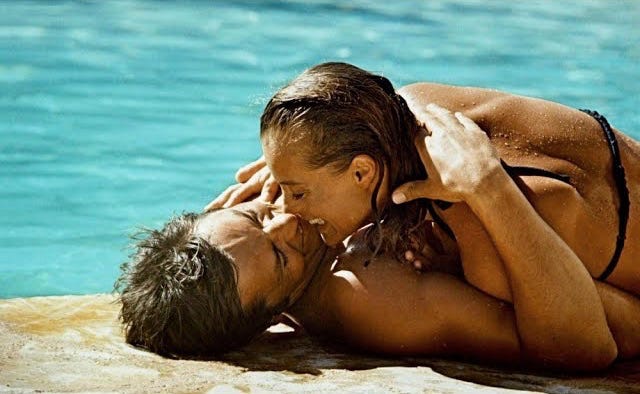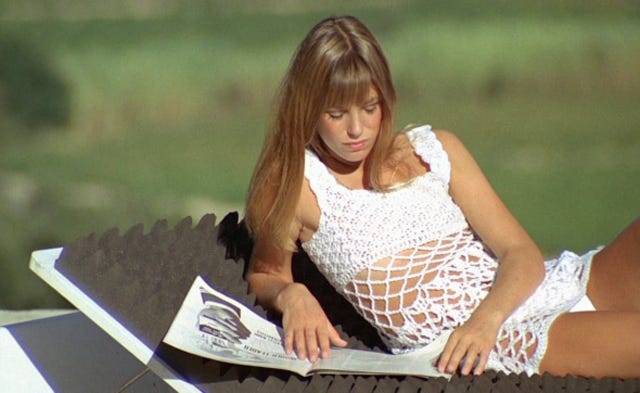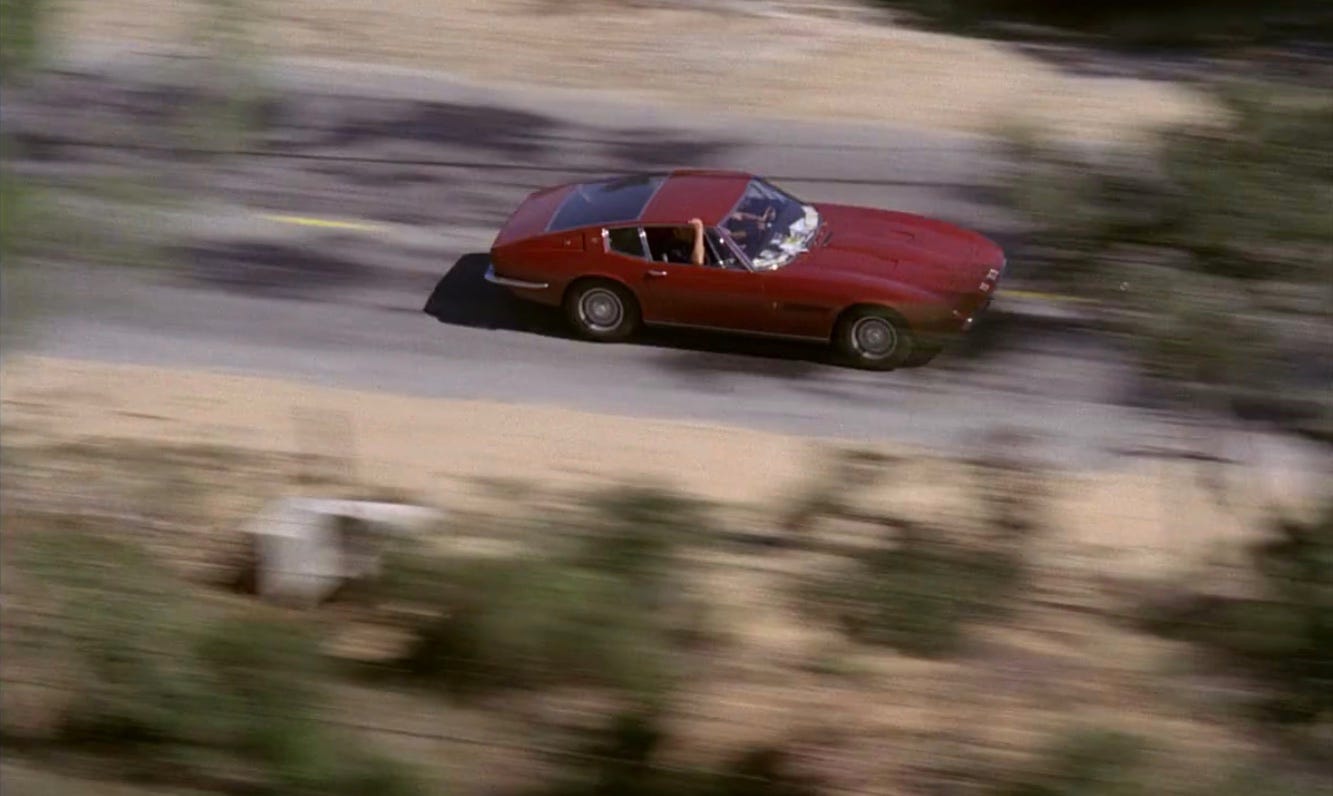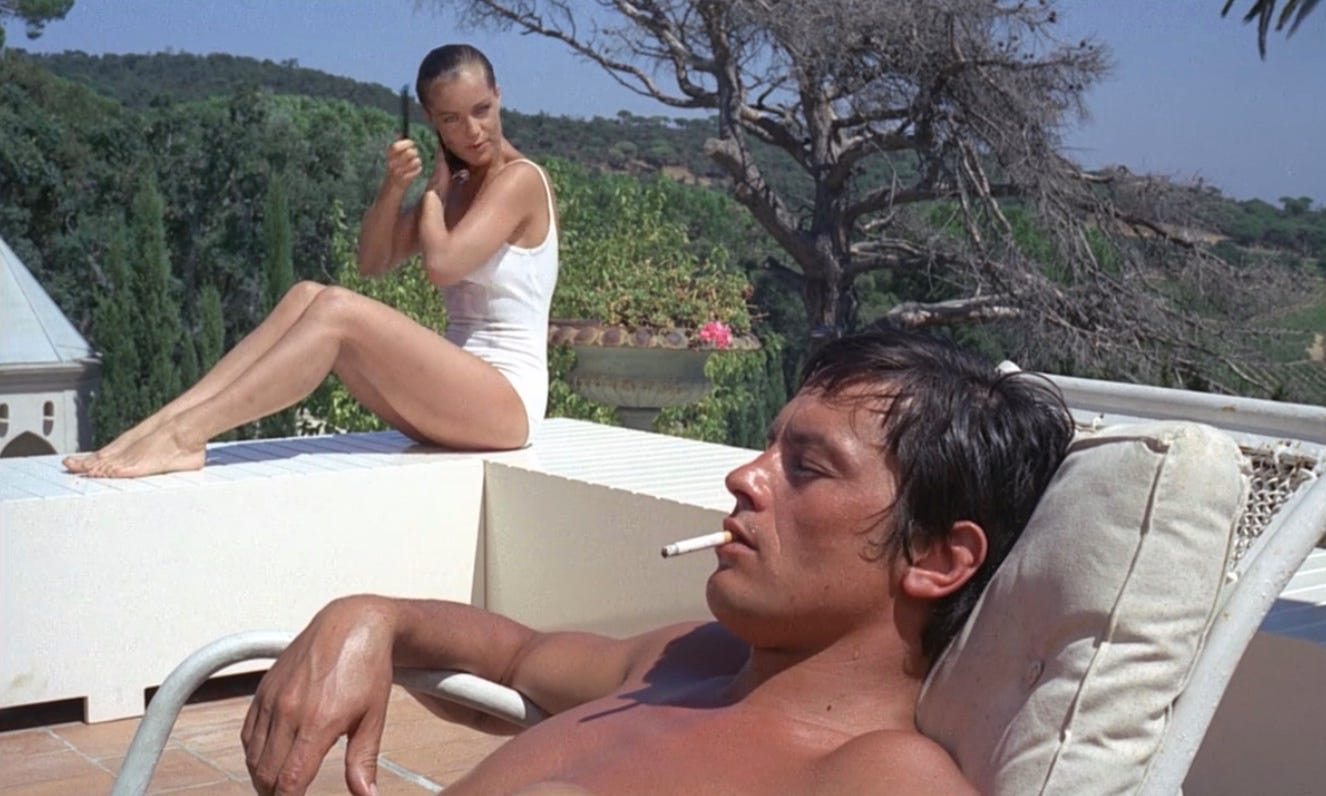It’s time for a jetset double bill on Luke Honey’s WEEKEND FLICKS. Cinema for Grown Ups. On Sunday morning, we’ll revisit the London of 1978, where Disco met Debrett’s and Old Etonians boogied on down to New York City Girl. But first up, it’s Jacques Deray’s masterpiece, La Piscine: sun, sex and skulduggery in 1960s Saint-Tropez…
Just what is it about cinema and swimming pools? Over the years, those rectangular parallelepipeds of sparkling turquoise have inspired numerous film directors. François Ozon’s Swimming Pool (2003) was one of the first films we covered, back in 2023, and it’s rather good, set in a desirable villa in the Luberon, with Charlotte Rampling as a jaded thriller writer. Then there’s The Swimmer (1968), based on John Cheever’s short story, a superb film, an exposé of shallowness and hypocrisy in surrealist, suburban Connecticut. And there’s Sunset Boulevard (1950), with struggling screenwriter Joe Gillis found dead, floating in his swimming pool, and based, surely, on the curious slaying, in 1922, of Silent film director, William Desmond Taylor. And then, of course, there’s The Great Gatsby (1974), with the ‘cluster of leaves… tracing, like the leg of transit, a thin red circle in the water’. And there’s A Bigger Splash (2015), starring Tilda Swinton and Ralph Fiennes, a sort of loose remake of Jacques Deray’s La Piscine (1969); and the David Hockney bio-pic of the same name, from 1973. And the excellent Deep Water (2022), based on the Patricia Highsmith thriller, starring She-Who-Can-Do-No-Wrong, Cuban sexpot Ana de Armas. Swimming pools, I suppose, to the more imaginative, are a symbol of bourgeois decadence. There’s a sinister presence in them chlorinated waters. On the other hand, it may also just be an excuse to film beautiful people with their kit off.
And then yesterday, I discovered that La Piscine (1969) — the one and original, directed by Jacques Deray, music by Michel Legrand — is now available, as a freebie, to Amazon Prime Video subscribers. Great news, as until now, in Britain, the only way to see the film was via a rather expensive and hard to find DVD, without English subtitles. And good on Amazon, as when it comes to French cinema, sometimes I struggle to find digital downloads of well-known, and much loved, films. Un Homme et Une Femme (1966) anyone? Before we begin, the first thing to get your head around is that there are two versions of the same film (La Piscine) out there. In spoken French and spoken English, the latter for the international market. Presumably, Deray would shoot one take in French, and then film the same take all over again, but in English? The French version is slightly longer and has slightly different editing. And the English (i.e. international) version appears to have a different ending — with a few seconds of actually rather significant footage tacked on ‘for moral reasons’, which sort of changes everything. The version on Amazon Prime Video is the international release, with spoken English. There’s a lovely crisp definition (has it been remastered?) and rich colour, but a slightly stilted Eurotrash quality to the vocals, “ow d’you say?”, translated, apparently, into English directly from the French script, as is.
There seem to be two critical views of La Piscine. It’s either a sophisticated masterpiece of French psychological drama, a study of sexual jealousy and possessiveness, or it’s all style over substance, an empty shell, ‘gossip-column fodder in its time’. I’m with the admirers. There’s something remarkably deadpan about La Piscine, lobotomised, nihilistic even, but then, surely, that’s the whole point? Apart from a few minutes of swimming pool skulduggery, nothing very much happens. People swim, they lie by the pool in the sun, they consult with the housekeeper on the menu for dinner, they mix cocktails and slip Rita Rey’s Ask Yourself Why onto the gramophone. The girls sashay around the villa in white bikinis, and sometimes take them off, and the boys take the Maserati for a drive, up in the hills above Saint-Tropez, filmed from a helicopter, like a television commercial for Martini.
Thirty-something Jean-Paul (Alain Delon) and his girlfriend, Marianne (Romy Schneider), are on holiday on the Côte d’ Azur, alone (apart from Emilie, the housekeeper and cook), and everything seems fine and dandy. They’re in love, there’s an exciting sex life, they’re both beautiful: an idyllic life exemplified by Michel Legrand’s upbeat and romantic intro, and then, bit by bit, you discover that things, perhaps, ain’t what they seem. The villa doesn’t belong to them; it’s on loan, from some rich friends who’ve ‘gone to India’. Jean-Paul’s a failed novelist whose abandoned serious writing for life as an advertising executive. And taking his car into account (a Renault R8 Gordini, a souped-up version of Renault’s bog-standard ubiquitous family car), he’s doing okay-ish, it’s a top-of-the-range model, which suggests aspiration, but it’s not exactly in the affluent stakes. And he’s a recovering alcoholic. And then, out of the blue, their peace is shattered by the unsolicited arrival of old friend, Harry (Maurice Ronet) — a little bit older, successful, rich and bloody annoying — and there’s a Maserati and a cute, kooky, eighteen-year-old English daughter, Penelope (Jane Birkin), with wonky teeth and a figure to die for. And it gets worse, as Marianne is a former lover of Harry, and he’s still got the hots for her, which is understandable as hey! It’s Romy Schneider.
The contrast between the two men couldn’t be greater. Jean-Paul’s a near recluse, cool, sure, hey! It is Alain Delon! But understated with his dark sunglasses, dangling Gauloise and short-sleeved checked shirts. Flash Harry, in contrast, is going through a midlife crisis, (Ronet was forty-two), slightly fleshy, a tight, see-through shirt unbuttoned to the navel, immediately bringing to mind that wickedly sharp quote from Anthony Shaffer’s Sleuth (1972), which sums it up better than I can:
I’ll bet you’re easy in a ski lodge, and easy on a yacht and easy on a beach. I’ll bet you a pound a penny, that you wear a gold charm round your neck, and that your chest is hairy and in summer matted with sun oil.
And it gets worse. Harry — and he really should know better — has this appalling habit of driving into Saint-Tropez, picking up a party of younger hipsters he’s never met before, and taking them back to the villa for party time. Spontaneous and unplanned. Reminding me of those white stretch limos you see on a Saturday night, in Soho, with the hands of drunken PR girls sticking out of the window, brandishing warm bottles of Moët. Enjoy! The dark art of verbing. Okay, it’s perhaps not quite as bad as that, as after all, this is 1969, and the ‘kids’ by modern standards have a Gallic cool. Funky dance moves in the Sitting Room and a reluctant Jane Birkin strutting her stuff to the strains of a Hammond organ.
And then Penelope, who clearly has a thing for Jean-Paul (and like him, is rather introverted), takes him aside and tells him that, actually, Daddy more or less despises him and thinks he’s a loser. Nice one, Pen. An eighteen-year-old girl, going on ten. Like a character from a Françoise Sagan novella (Bonjour Tristesse’s Cécile immediately springs to mind), where teenage girls think they’re terribly sophisticated and grown up, but they’re not. It’s like their minds have yet to catch up with their grown-up bodies. Careless actions and throwaway remarks can lead to serious consequences.
The release of La Piscine in 1969 came with a certain frisson. Despite their very different backgrounds, Delon, famously, dated Romy Schneider for five years, European cinema’s golden couple, and although they broke up in 1963, Romy remained the love of his life until her premature and tragic death in 1982. And during the making of La Piscine, the body of Delon’s friend and bodyguard, Stefan Marković, was discovered dumped on a rubbish tip, to the west of Paris, apparently murdered. The case remains unsolved to this day. This notorious affair gathered its own momentum, fuelled by rumours of sex parties involving the participation of film stars and members of the French government. But it’s this genuine sexual tension, between Delon and Schneider, which works beautifully on screen. And in La Piscine, it’s not so much what happens, as frankly, there’s not much of that going on — but what the characters are thinking to themselves, and the way they relate to each other, however dysfunctional, expressed through mannerisms, eye movements and subtle gestures. Now that’s acting. And that’s cinema.
I watched La Piscine (1969) via Amazon Prime Video, where it’s available as a freebie for subscribers. There’s also a two DVD disc set in a box, featuring the two versions of the film, in French and English, which you can buy second-hand for around five quid, online. And there’s a more expensive Blu-ray version, which looks great. Definitely a film for a Blu-ray set up.
Friday’s film recommendation is normally for paid subscribers, but as it’s 90°F in the shade out there, and I’m in a good-ish mood, this one’s on the house. It will, at least, give you a good idea of the sort of thing you’ll receive in your inbox, every Friday morning, if you become a paid subscriber. £5 a month, or £50 a year. Which guarantees you two film recommendations every weekend and access to the entire WEEKEND FLICKS. archive now running at some 159 films.
For La Piscine (1969) it has to be Martini on the Rocks. With a twist. Then I’m back on Sunday with another film recommendation. To the London of 1978, where, fuelled by the petrodollar, the punters aspired to urbane sophistication: Concorde and Cartier, shagpile carpets and Chinese antiques (made in Hong Kong). And, for this one, it’s very much a case of a film having a certain something. A je ne sais quoi. A film doesn’t necessarily have to be good. But it does need to have charm. Until then, from the Lido, Au Revoir.












Thanks to your review I've seen this again. And I think it was my first time in English (rather than French with subtitles, I should add to avoid sounding too pretentious!).
The Amazon print is very good and I love the sets, style, and costumes. The sense of life with lobotomy, as captured, rings entirely true from memories of summer vacations in the south of France - maybe it's something to do with the heat mixing with all that local vin rosé, apparently on tap? This may also be the first time I've ever liked Alain Delon in anything - he's usually just smooth and annoying Overall, it captures a perfect sense of place and time.
I have one minor quibble in that I prefer the ending as conjured up by the near-remake A Bigger Splash. Also Ralph Fiennes and his ghastly daughter were so much easier to dislike. But that Maserati... ooh la la: all is forgiven!
Thanks for sending me off on a William Desmond Taylor vortex this afternoon so I could procrastinate from the desk job.
Next I might look up Delon’s bad behaviour…
He is my least favourite Ripley though.